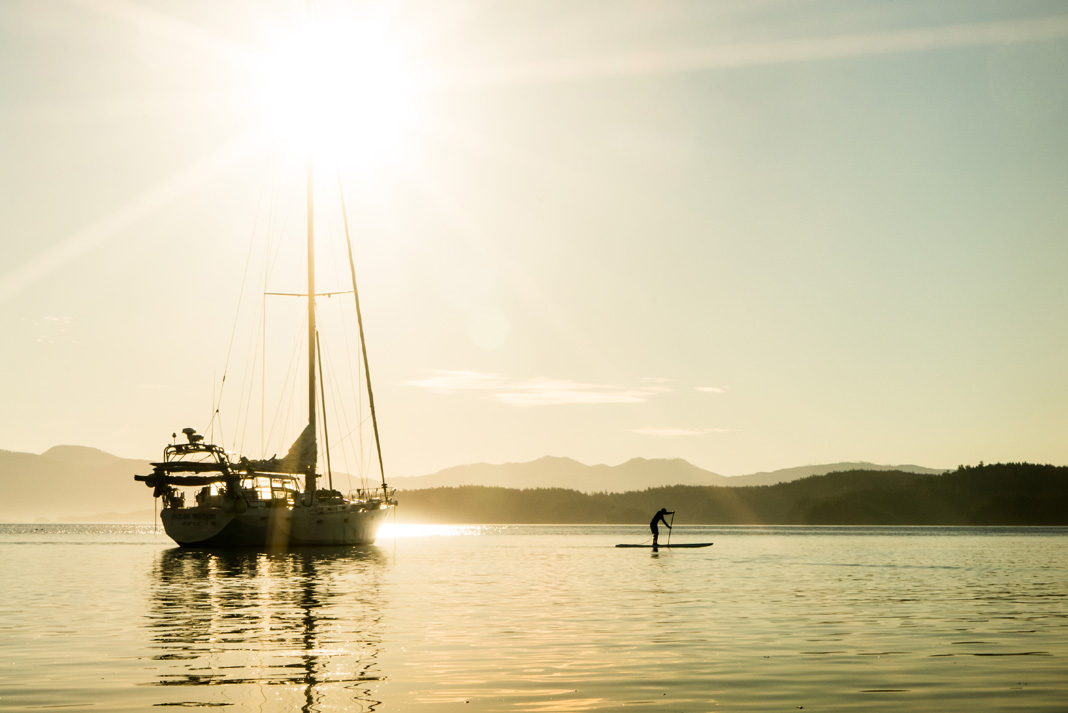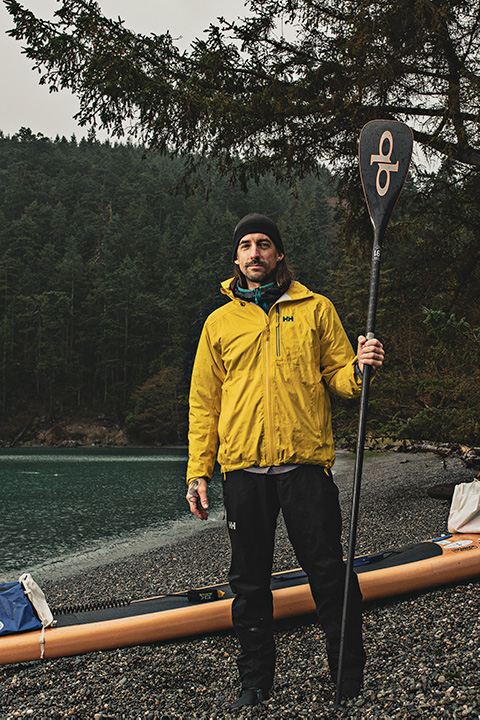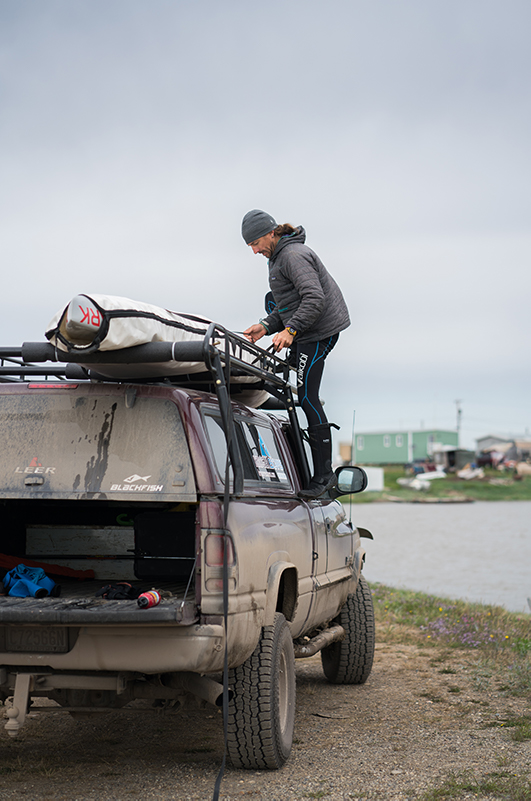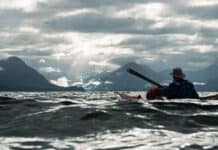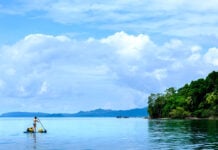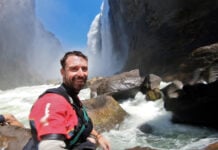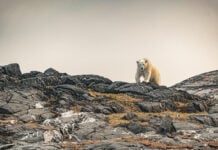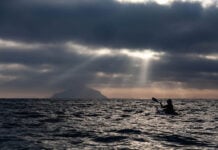In June 2017, after a couple of days of paddling up the Strait of Georgia from Victoria, British Columbia, in the annual Race to Alaska, Karl Kruger pulled into Campbell River on his custom 17-foot, 4-inch standup paddleboard for a short resupply and rest stop. He ate a burger and bought a few rolls of athletic tape for his hands—both permitted within the rules of the unsupported, non-motorized 750-mile race from Port Townsend, Washington, to Ketchikan. Then, despite the gale warning issued by the weather service, and the fact most of the sailboats in port for pit stops were tying extra lines to wait out the approaching storm, Kruger put on his wetsuit and headed back onto the water.
He slipped through Seymour Narrows during the slack tide, bolted up the rest of Discovery Passage and angled into Johnstone Strait in time to catch the ripping southeast wind. With the gale at his tail, Kruger surfed the strait, riding waves and covering 72 miles in 13 and a half hours. He reached Ketchikan in a total of 14 days, becoming the first—and still the only—paddleboarder to complete a race billed as an oceanic Iditarod.
Onto the next challenge
This past July, Kruger drove 2,400 miles over four days from his home on Orcas Island, Washington, to Tuktoyaktuk, Northwest Territories, with a custom 18-foot, 4-inch board on top of his truck. He was planning to embark on a 1,900-nautical-mile solo paddleboard expedition through the Northwest Passage, a trip that would not be conceivable without the warming impacts of climate change. Kruger had trained and prepared for the journey for two years.
An experienced climber, skier and sailor, the 47-year-old waterman has spent countless hours pushing himself, often alone, in cold and wet places. With his skills and knowledge, bolstered by food and gear sponsors and months of punishment in the gym, paddleboarding through the storied Arctic sea route from Tuk to Pond Inlet, Nunavut, felt like a natural progression. An act of defiance against a rectilinear world in which we have become so detached from the wilderness and so dependent on technology we are rapidly, and perhaps irrevocably, losing touch with the physical and mental qualities making us human.
But as Kruger passed through Inuvik on the Dempster Highway and arrived in Tuk, doubts that had been bouncing around in his mind crystallized into grave concern.
The cost and logistical puzzle of mailing food drops to Inuit communities along the coast meant he would have to pick a pair of resupply points and straight-line between them with a loaded-down SUP. The ice was opening up slower than predicted, which could leave him stranded somewhere for a couple weeks—a problem for someone with limited funding and limited time, considering the carpentry and sailing charter businesses he runs and had left on cruise control. Plus, he was meeting people in the Northwest Territories who he had tried but failed to connect with on the phone over the previous months. When they talked in person and started to understand Kruger’s mindset and motivation, they offered to organize invaluable support, such as stashing his food caches at fish camps throughout the passage. This would allow Kruger to travel light and spend time meeting with locals along the route. So, after a sleepless night in Tuk, Kruger made the gut-wrenching decision to postpone his paddle across the top of Canada until July 2020.
In Campbell River, he weighed the risks and opted to test and trust himself in the storm. But on the shore of the Arctic Ocean, overriding a burning urge to get started, he knew the right choice was to pack up his truck and drive south. When the water mediates your interactions with everybody and everything, you have no choice but to embrace the messiness of life and the healing power of ancient rhythms.
The formation of an endurance paddleboarder
Kruger grew up with a paddle in his hands in New York’s Adirondack Mountains. His half-Austrian, half-Algonquin father, Carl Haischer, was a forester and hunting and fishing guide whose ancestors migrated south from Quebec in the mid-1800s. Orphaned and abused as a child, Haischer imparted both violence and a timeless connection to the outdoors. He pushed his young son brutally on marathon hikes and climbs, summiting high peaks without trails. He kicked the boy out of the car and forced him to walk barefoot for miles on a gravel road. He whipped him with a belt. Once, he took a sharpening stone and rubbed it against his son’s wrist until it was grinding into bone. He also beat his wife. During one awful attack, Kruger sat upstairs in his room listening to his father’s yelling and mother’s screaming, a shotgun across his knees, ready to shoot the old man. The police took Haischer away that night.
“My dad was a monster,” says Kruger, who, the day he turned 18, legally changed his name from Carl Haischer Jr. to Karl Kruger, swapping the C for a K and taking on his mother’s birth name.
“I hated him. But I also owe him a debt of gratitude because of what he taught me about being in the woods and being on the water. He showed me how to read the stars and how to paddle without making a sound. The first time I entered flow state, I was with my dad. But I had to pay a lot for what I learned. I was 10 when he ground that stone into my wrist. He told me to say when it hurt too much—and it came to me in a flash that I was never going to tell him it was too much.
“He gave me power that day. I just planted my feet and stared. I showed him that I was stronger than he was. I don’t remember being whipped after that.”
Outdoor pursuits were Kruger’s escape. Despite its link with his father, nature was a salve. Kruger left home at 15, sleeping in his car and teaching sailing while managing to finish high school. He then drifted to California, where he taught windsurfing and discovered surfing. But Kruger experienced culture shock on the west coast, so he moved back east and then followed skiing and climbing guiding gigs around the United States and up to Alaska. An itinerant dirtbagging existence was the only way he knew how to stay sane.
Eventually, he studied ecology at woodsy Paul Smith’s College in the Adirondacks, where students could borrow canoes outside the library. Then he transferred to Western Washington University, on the edge of the Pacific in Bellingham, where he majored in environmental science. At university, Kruger met a woman and fell in love. They settled on Orcas, had a baby and started a carpentry business to finance their sailing charter business. Both companies are successful; the marriage was not. When Kruger did the Race to Alaska in 2017, he was feeling increasingly drawn to a life at sea, while his now ex-wife, an intrepid sailor but also a dancer, was rooted on land.
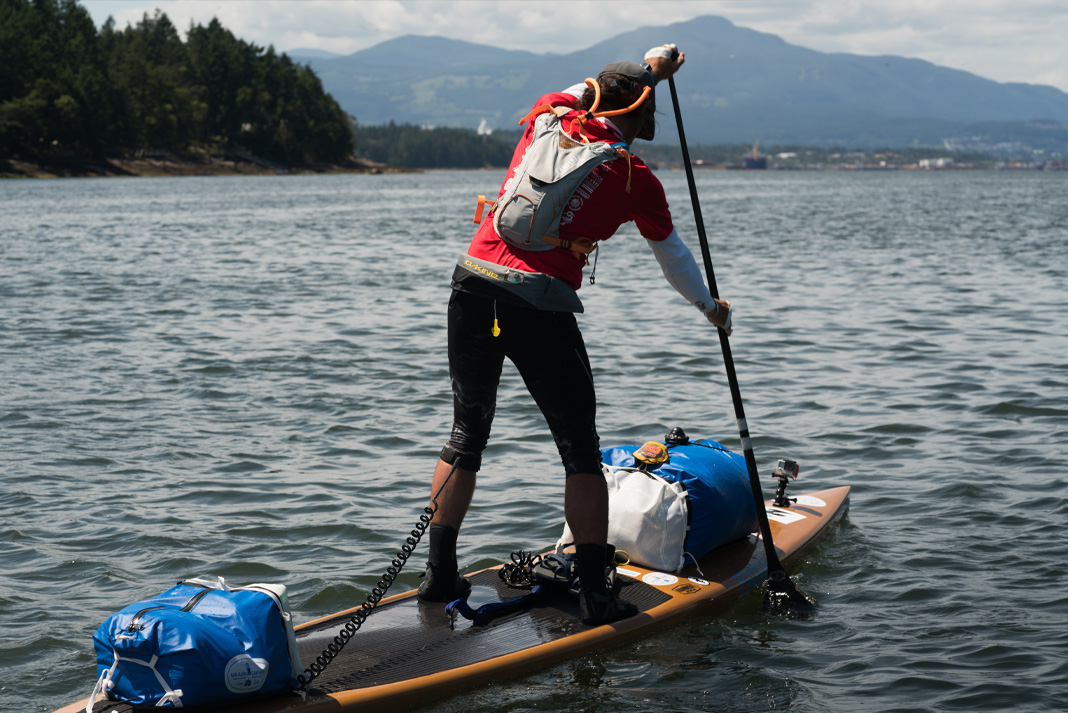
Moving to the west coast expanded Kruger’s world. During a surf trip with friends on Washington’s Olympic Peninsula in 2010, he was introduced to paddleboarding. A friend hooked Kruger up with a board and he took it for a spin. He was gone for three hours and never looked back. Kruger experimented with different stroke techniques, skipping work to downwind whenever a system blew in. He entered races throughout the region and trained by circumnavigating Orcas and other islands in the San Juan archipelago. He was drawn to distance, not speed. Although Kruger had no idea how dramatically SUP would change his life, the connection to nature it bestowed was instant and intense.
“I love the fluidity of movement, the fact you’re using your whole body—right from your toes to your fingertips, every little thing is singing,” he says. “You’ve got this rhythm. Then there’s your breath. It’s meditative.
“We crawled out of the water a long time before we walked,” he adds. “It’s integral to who we are. I love looking into a fire as much as the next guy, but to me, the pattern of wavelets washing over the nose of my board is more primal than fire. It’s transcendental. I’ve done the 24-7 climbing thing, and I loved it, but water is different. It’s a living, breathing thing that spans the globe, with new conditions every minute. To be on a paddleboard in that unfiltered way, with so little between yourself and the environment, you’re so connected to it. To me, it’s the most satisfying form of being on the water. All my life, I’ve had to react quickly. On the water on a SUP, everything slows down.”
During the Race to Alaska, paddling up a coast he knew intimately from dozens of sailing trips, Kruger’s affinity for SUP grew even stronger. More than any other outdoor pursuit, it made him feel whole.
“When I’m out paddling, that is my heaven, that is when every fiber of my being feels at home,” he says. “There’s absolutely nothing to worry about, because it’s all out of my control. All I have to do is keep paddling. As painful and horrific and scary as all of the shit was with my dad when I was a kid, I wouldn’t trade it for anything, because it enabled me to fly higher. There’s nothing nature can do to me that will hurt as bad. When I paddled to Alaska, it was easy. All I did was go for a long paddle, like millennia of paddlers did on the coast before me.”
Nature as healer
When Kruger arrived in Ketchikan at the end of the 2017 Race To Alaska, he wanted to keep going. That’s where his plan to paddle the Northwest Passage was born. While he admires Chris Bertish, the South African adventurer who crossed the Atlantic Ocean on a modified SUP two years ago, Kruger loves traveling along coastlines and finding little nooks for making camp. The north’s midnight sun will allow him to paddle when conditions are decent, and to rest and eat when it’s too windy. Conversations with hunters in Tuktoyaktuk convinced him a small handgun should be enough to scare away polar bears. And fishers told him that a small net, set before going to sleep, should provide plenty of Arctic char when he wakes up.
The Northwest Passage appealed to Kruger because he prefers the cold to heat. It feels like the alpine even though you’re on the ocean. He’ll have to adjust to vastly different tidal conditions, but that dynamism is part of the draw, as is the prospect of being alone in the wilderness for days on end.
“Nature is the only home I’ve ever had,” says Kruger. “When I wake up and hear waves crashing, when I see a whale or weather patterns and currents work—it’s like I’ve surrounded myself with all these details in lieu of fitting in anywhere else.
Humans have been evolving for thousands of years to interact with nature, and in two short generations we’ve lost that. Now, we’re all stuck behind our computers and are messing with our phones. My joy while paddling to Alaska was slipping back into the skin of what it means to be a human being and moving through this environment happily and safely and comfortably. Not to survive but thrive.”
Kruger was profoundly disappointed when he postponed the expedition. However, he has come to see the extra year of waiting as a small wobble in the grand spin of his universe. It gives him more time to study ice conditions. To fine-tune his strength and stamina training. To line up more sponsors. To sort out the logistics of food drops. He speaks about “Kodak courage”—when athletes succumb to the pressure to perform and risk getting into dangerous situations.
Instead, he’s preparing painstakingly for a journey that can be seen not only as an act of personal healing, but also an attempt to inspire others to rekindle our fractured relationship with nature.
Ottawa, Ontario-based writer Dan Rubinstein has written for The Economist, the Globe and Mail, Cottage Life, and Canadian Geographic, where he worked as the managing editor.


